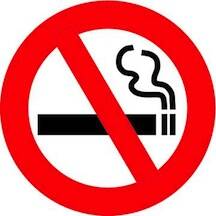The feds want to ban smoking in all public housing, according to The New York Times. A proposed rule, now awaiting public comment, would prohibit “lit cigarettes, cigars and pipes in all living units, indoor common areas, administrative offices and all outdoor areas within 25 feet of housing and administrative office buildings.” Electronic cigarettes are not covered by the rule, “but federal officials are seeking input about whether to ban them.” Marijuana is not mentioned specifically, but the Atlantic’s Kriston Capps checked out the situation in Washington, D.C., which has legalized pot: “According to the city, it’s legal for residents to smoke marijuana indoors. But according to HUD, public-housing residents cannot smoke marijuana inside—even though it’s illegal under D.C. law for them to smoke pot outside.”
Welcome to Two Americas.
There is obvious good intent behind the ban, but it’s still “nanny state” government. Prohibiting people from smoking in their own homes because of their economic status is stigmatizing and infantilizing. It’s no different than prohibiting the purchase of a can of soda or candy bar with food stamps: a reminder that autonomy is reserved for those who can afford to pay for it.
People with means have moved on to other vices—wines and craft cocktails, fast cars and boats, hiking up mountains in dangerous weather without proper gear—and can look down on more proletarian habits. Smoking should be banned in common areas, and public-health programs should continue to help people quit, but there’s something small-minded about punishing even the special-occasion cigar in one’s living room.
Call this Libertarians Are Occasionally Right Day, for here’s another example of how excessive government could be hurting the poor. At the blog Market Urbanism, Emily Washington reports on the “regressive effects of land use regulation,” including limits on housing density, parking requirements for new development, and historic-preservation laws that serve to keep out new residents. (One possible example: a new ban on multi-story homes in a section of Palo Alto, California, ostensibly to preserve the aesthetics introduced by mid-century homebuilder Joseph Eichler.) Ms. Washington cites research showing that land-use regulations account for more than 20 percent of housing costs in metro areas including San Francisco, Los Angeles, and Washington, D.C.
She concludes:








